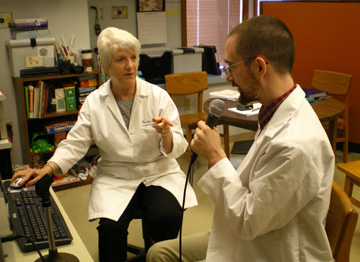Clinical professor gives faculty and community a voice

Barbara Solomon, clinical professor in SLHS, and George Wolford, graduate clinician in SLHS, demonstrate diagnostic techniques used with patients with voice problems. (Photo provided by Barbara Solomon)
For Barbara Solomon, helping people find their voice is merely part of a normal day.
Solomon, clinical professor in the Department of Speech, Language, and Hearing Sciences, works with people from Purdue and the Lafayette area who have been diagnosed with voice disorders. Her work, conducted with graduate students as part of their curriculum, includes developing treatment plans for patients of all ages. She also conducts workshops, including one scheduled for next week.
After seeing the far-reaching effect of voice disorders on people of all ages, Solomon dedicated herself to the prevention and treatment of voice disorders throughout the lifespan. As a clinical professor at Purdue, she is responsible for establishing practicum experiences at otolaryngology (ear-nose-throat) outpatient facilities and developing supplemental treatment materials for adults and children suffering from voice disorders.
According to Solomon, it is estimated that nearly 10 percent of the U.S. workforce would be classified as heavy occupational voice users. Teachers are one of the groups most affected. Considering only lost workdays and treatment expenses, the annual societal cost of voice problems in teachers alone may be approximately $2.5 billion.
"Lost productivity, in terms of canceling classes or forcing lectures to move at a slower pace, is detrimental to both professors and students," Solomon says. "Knowing how to avoid voice strain and maximize teaching time is a win-win situation for everyone."
Voice disorders can be caused by the formation of sores, polyps or nodules on the vocal cords. Excessive rubbing occurs when cords are not properly lubricated, usually due to excessive caffeine use, refluxing, or dehydration.
Symptoms manifest in many ways, including chronic hoarseness and throat clearing. Speakers typically report inability to use vocal inflections and speaking with extensive effort. When left untreated, voice disorders can lead to sharp or dull pain while speaking and possibly long-term voice loss.
Though a multitude of factors cause voice disorders, Solomon says that overuse and neglect of the vocal cords are mostly to blame.
"Just like basketball players warm up before they go on the court, your vocal cords need to stretch before undertaking lectures," Solomon says. "Vocal warm-ups, periods of relaxation and use of amplification during long talking periods, and staying hydrated can help already strained voices."
Solomon is bringing her experience to the Center for Instructional Excellence this September, co-leading a workshop with Richard Sullivan Lee, associate professor of theatre in vocal production and classical text.
The Sept. 28 workshop will be open to any Purdue faculty, staff or graduate student interested in maximizing voice use in the classroom. The workshop, which runs from 9:00 to 10:30 a.m. in Stewart Center, Room 322, will feature a collection of hints to prevent or identify voice problems. According to Solomon, these small, practical tips will incorporate easily into a busy schedule.
"Taking care of your voice comes down to identifying detrimental habits," Solomon says. "Recognize high-strain speaking situations, such as talking on your cell phone in the car, and try to reduce how often you do it. Few recognize that they talk significantly louder on cell phones. Factor in the sound of the car, background noise and passengers, and we strain our voices significantly every day without noticing."
Solomon also encourages any faculty and staff experiencing voice problems to contact the SLHS Speech-Language Clinic, which is open to the public. The clinic just celebrated a twenty-year collaboration with Lafayette Otolaryngology Associates and most recently with the IU Health Arnett.
In addition to voice therapy, the Speech-Language Clinic offers a variety of services including an adult language program for clients with language problems following brain injuries, a birth-three program, adult geriatric programs and the Purdue Preschool Language Program.
Visits are by appointment only. To schedule an appointment, call 49-44229.
